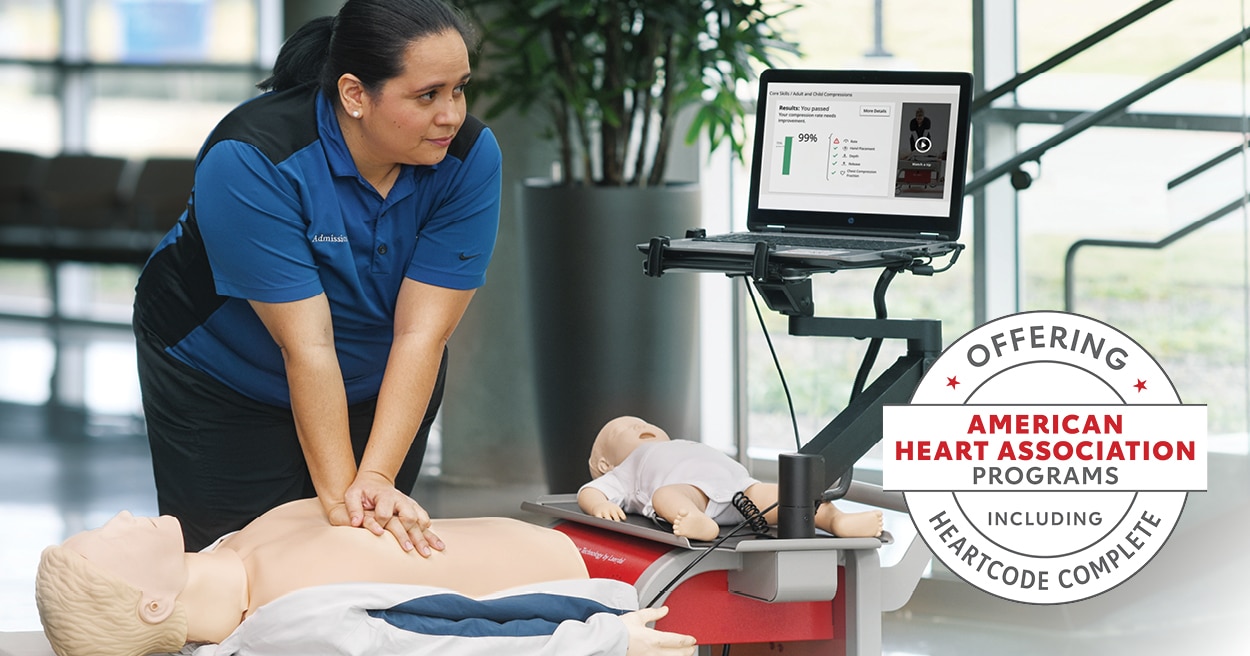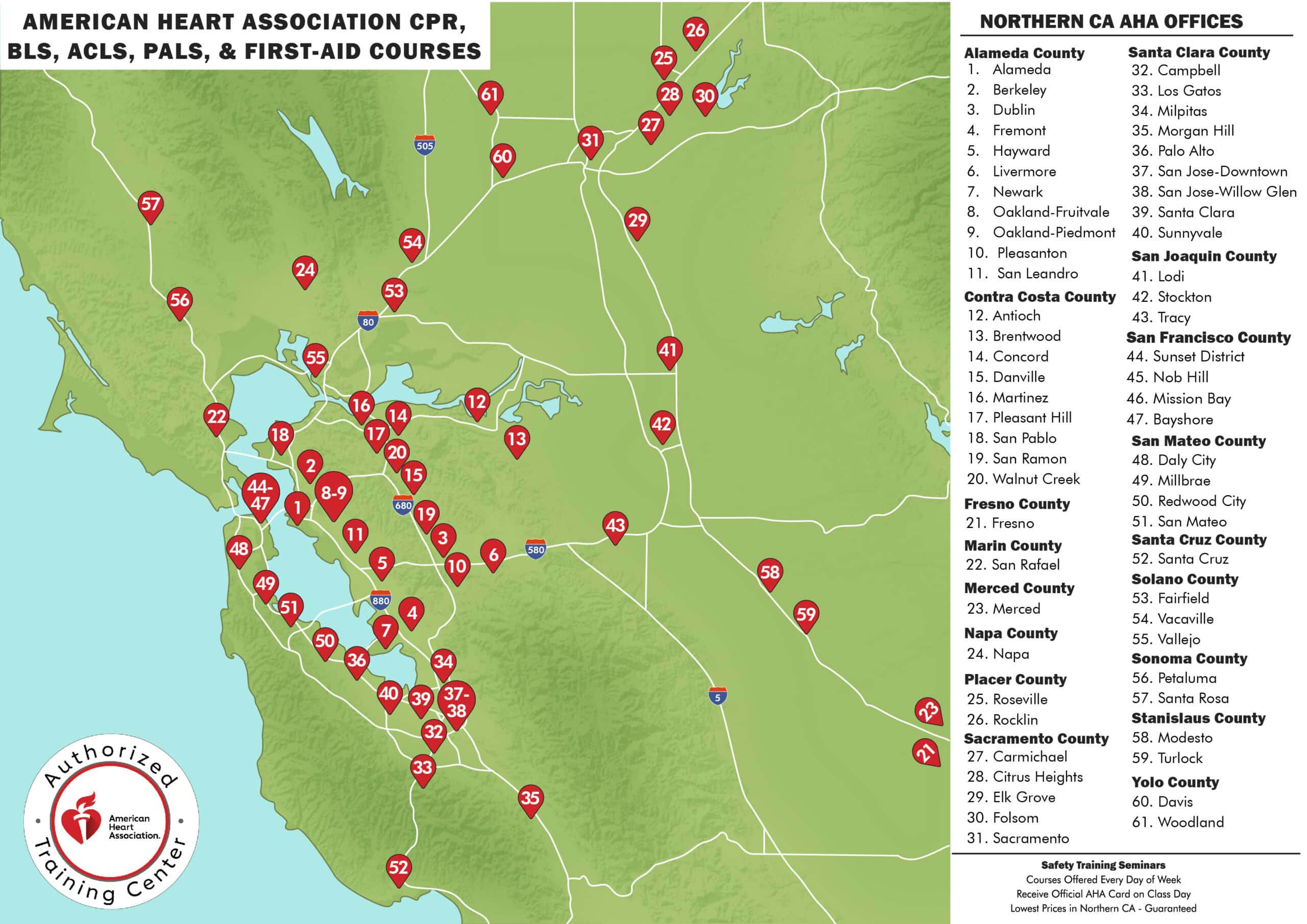American Heart Association© BLS CPR Certification Classes in Visalia

American Heart Association© BLS
Course Name: BLS CPR Provider Heartcode (Initial or Renewal)
Online BLS Course Length: 1-2 hours (At your home.)
Skills Testing: 40-60 minutes (At one of our over 60 CPR testing sites.)
Description: CPR (adult, children, & infant), 2 person CPR, AED, bag mask
Price: $120 (This includes the online BLS course, skills testing, and card.)
Certification: American Heart Association© BLS certification card.
When: BLS classes are offered Monday – Sunday from 7 am to 6 pm
Card Issuance: You will receive the BLS certification card on day of class.
Add ons available: ACLS, PALS, First-aid, Opioid, or Bloodborne Pathogens
Low Price Guarantee: Lowest prices in Visalia, CA. Price matching policy.
View Upcoming BLS Courses in Visalia
BLS Courses Near Me in Visalia & Other Cities

- 5215 W Noble Street, Suite 102, Visalia, CA 93277
- (559) 218-5860
American Heart Association BLS CPR Classes in Visalia: Your Guide to Saving Lives
Understanding Basic Life Support (BLS)
What is BLS?
Basic Life Support (BLS) refers to the type of care that first responders, healthcare providers, and trained public members provide to individuals experiencing cardiac arrest, respiratory distress, or an obstructed airway. The primary goal of BLS is to maintain blood circulation and breathing until advanced medical care can be administered.
Chest Compressions: Applying pressure on the chest to manually circulate blood to the brain and vital organs.
Rescue Breaths: Providing breaths to the victim to ensure oxygen enters the lungs.
Automated External Defibrillator (AED) Use: A portable device that analyzes the heart’s rhythm and, if necessary, delivers a shock to help the heart re-establish a regular rhythm.
What to Expect in AHA BLS CPR Classes
American Heart Association BLS CPR classes are structured to provide comprehensive training that is easy to understand and practical to perform. The classes cover:
- Adult, Child, and Infant CPR: Participants learn to perform CPR across different age groups, recognizing that techniques may vary slightly depending on the victim’s age and size.
- Relief of Choking: Instruction on how to help individuals who are choking, a common emergency that requires immediate action.
- Use of AED: Hands-on training with an AED, so participants are comfortable using the device in a real emergency.
- Team Dynamics: For healthcare professionals, the course includes instruction on effective team dynamics and communication when responding to a cardiac arrest situation as part of a group.
Why Take AHA BLS CPR Classes in Visalia?
Benefits of Certification
Being certified in BLS CPR offers numerous benefits:
Preparedness: Emergencies can happen anytime, anywhere. Being trained in CPR means you are prepared to respond effectively, whether at work, home, or in public.
Confidence: Knowing you have the skills to potentially save a life boosts confidence in handling emergency situations calmly and efficiently.
Career Requirements: Many healthcare jobs require BLS certification as a condition of employment. Nurses, doctors, EMTs, and other healthcare professionals must maintain their certification.
Community Safety: A higher number of certified individuals within a community increases the overall safety and readiness to handle cardiac emergencies.
Visalia’s Commitment to Health and Safety
Visalia, known for its close-knit community and proactive stance on public safety, is an ideal place for residents to undertake such essential training. The city’s commitment to health and safety is reflected in the availability of AHA BLS CPR classes, making it easy for healthcare professionals and residents to receive proper training.
Conclusion
BLS CPR training is a critical skill that empowers individuals to act decisively during emergencies. In Visalia, the availability of American Heart Association BLS CPR classes ensures that both healthcare professionals and laypersons have the opportunity to learn these life-saving techniques. By participating in BLS CPR training, you can make a tangible difference in your community, potentially saving the lives of those who suffer from sudden cardiac arrest. Whether you are a healthcare provider, a public safety official, or a concerned citizen, taking a BLS CPR class in Visalia is a proactive step toward a safer and more prepared community.
FAQs
Who should attend BLS CPR classes in Visalia?
BLS CPR classes are suitable for a wide range of individuals, including healthcare professionals, educators, childcare providers, and members of the general public who want to be prepared to respond to cardiac emergencies.
How long does it take to complete a BLS CPR class?
The duration of BLS CPR classes in Visalia typically ranges from four to six hours, depending on the specific course provider and format. Some providers may offer accelerated options for individuals with prior CPR training.
Is BLS CPR certification valid nationwide?
Yes, BLS CPR obtained in Visalia is valid nationwide. The certification is issued by the American Heart Association and is recognized by healthcare organizations, employers, and regulatory bodies across the United States.
